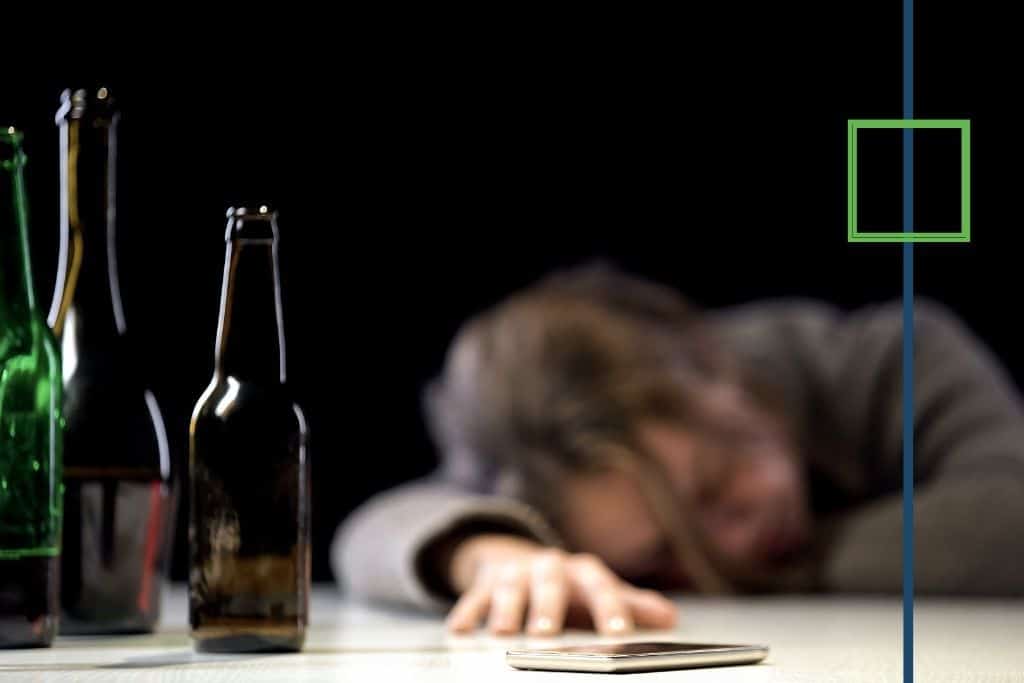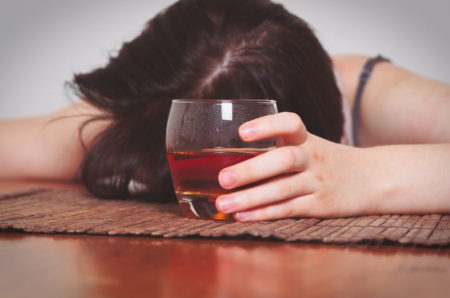What is Alcohol Poisoning?
Alcohol poisoning happens when there is so much alcohol in the bloodstream (blood alcohol content) that areas of the brain controlling basic life-support functions—such as heart rate, breathing, and temperature control—start to shut down. Symptoms of alcohol poisoning include difficulty remaining conscious, mental confusion, vomiting, trouble breathing, seizure, slow heart rate, clammy skin, dulled responses such as no gag reflex (which prevents choking), and extremely low body temperature. How does alcohol affect the brain? Alcohol can lead to permanent brain damage (wet brain) or death. Alcohol poisoning occurs when a toxic amount of alcohol has been consumed, usually in a short period of time, also known as binge drinking.

Someone experiencing alcohol poisoning can appear unresponsive extremely disoriented, or unconscious, with shallow breathing. This condition can be life-threatening and should be taken very seriously. Alcohol poisoning is clinically known as acute alcohol intoxication. Because of the wide availability of alcoholic beverages, alcohol poisoning is quite common – affecting almost ten percent of adults in the United States alone. The Centers for Disease Control and Prevention (CDC) [2], estimates excessive alcohol use causes approximately 88,000 deaths annually in the United States.
Diagnosis of alcohol poisoning always demands ruling out other conditions. In moderate and severe cases, measuring blood alcohol concentration (BAC) is important. Alcohol poisoning treatments should focus on avoiding complications and managing alcohol poisoning symptoms. Prognosis and management also change depending on the degree of intoxication, and on how long alcohol stays in your system. Alcohol poisoning can be successfully prevented by abstaining from alcohol or by learning how to reduce alcohol consumption safely.

Get Your Life Back
Find Hope & Recovery. Get Safe Comfortable Detox, Addiction Rehab & Dual Diagnosis High-Quality Care.
Hotline(844) 597-1011Alcohol Poisoning Symptoms
Alcohol poisoning symptoms can happen unexpectedly over a short amount of time. Therefore, when you are drinking alcohol, you might notice different alcohol poisoning symptoms. These symptoms will depend on the stages or levels of intoxication.
The degree of alcohol intoxication varies from person to person because they’re based on age, sex, weight, and other factors. But generally, there are seven stages of alcohol poisoning and their symptoms.
Sobriety or Low-Level Intoxication
If a person has consumed one or fewer drinks per hour, they’re considered sober or low-level intoxicated. At this stage of alcohol intoxication, you will expect that the drinker’s action will have no visible signs of alcohol poisoning, such as delayed reaction time and slurred speech. Their blood alcohol concentration (BAC), which measures how much alcohol is in the bloodstream, will be shallow at 0.01 to 0.05 percent.
Euphoria
If a person has consumed two to three drinks as a man or one to two drinks as a woman in an hour, they’ll experience the euphoric stage of alcohol intoxication.
Some Symptoms include:
- A slowed reaction times
- An increase in chattiness and confidence
- Lowered inhibitions
Most individuals describe this stage of intoxication as being “tipsy.” A person’s BAC at this stage might range from 0.03 to 0.12 percent.
Note that a BAC of 0.08 percent is the legal limit of alcohol intoxication while driving in the United States. Therefore, a person can be arrested for driving with a BAC above this limit.
Excitement
At this level, a man might have drunk three to five drinks in an hour or two to four drinks for a woman. At this point, a person will start to feel a significant loss of coordination and emotional instability.
Other Symptoms include:
- A loss of judgment and memory
- Drowsiness
- Vision difficulties
- Loss of balance
A person will appear visibly “drunk” at this degree. They’ll have a BAC of 0.09 to 0.25 percent.
Confusion
If a man drinks more than five drinks or a woman more than four drinks in an hour, they’ll enter the next stage of alcohol poisoning: confusion. This stage of alcohol intoxication is distinguished by a significant loss of coordination and emotional outbreaks. The person may not be able to stand up, may stagger when walking, and will likely be greatly confused about what’s going on.
People in this stage of intoxication are very likely to forget things happening around or to them. As a result, they may experience “alcohol blackout” without losing consciousness and may not be able to feel pain. This makes them at risk of injury. At this stage, a person’s BAC is very high. It’ll range from 0.18 to 0.30 percent.
Stupor
At this stage, a person no longer responds to the things happening around or to them. A person won’t be able to stand or walk. They may ultimately pass out or lose control over their bodily functions, becoming uncontrolled or vomiting uncontrollably. They may also experience seizures or have blue-tinged or pale skin. In addition, their breathing and gag reflexes will likely be weakened. This stage can be hazardous and fatal if a person chokes on their vomit or becomes critically injured. Any of these symptoms are signs that immediate medical attention is necessary. At this stage, a person’s BAC will range from 0.25 to 0.4 percent.

Coma
This stage is hazardous. A person’s breathing and blood circulation will be highly slowed, and motor responses and gag reflexes are nonfunctional. Their body temperature drops, and the person at this stage is at risk of death. Their BAC will measure 0.35 to 0.45 percent. Emergency medical attention is necessary at this point to avoid death and severe health problems.
Death
At a BAC of 0.45 percent or above, a person is likely to die from alcohol intoxication. It may seem like an individual has to drink a lot to get to this stage. But if you drink very quickly, you may get to this stage. The Centers for Disease Control and Prevention estimates excessive alcohol use causes approximately 88,000 deaths annually in the United States.
Get Help. Get Better. Get Your Life Back.
Searching for Accredited Drug and Alcohol Rehab Centers Near You?
Even if you have failed previously and relapsed, or are in the middle of a difficult crisis, we stand ready to support you. Our trusted behavioral health specialists will not give up on you. When you feel ready or just want someone to speak to about therapy alternatives to change your life call us. Even if we cannot assist you, we will lead you to wherever you can get support. There is no obligation. Call our hotline today.
(844) 597-1011Alcohol Poisoning Treatments
While waiting for medical help to arrive:
- Be prepared to provide information to the responders, including the type and amount of alcohol the person drank; other drugs he or she took if known; and any health information that you know about the person, such as medications currently taking, allergies to medications, and any existing health conditions.
- Do not leave an intoxicated person alone, as he or she is at risk of getting injured from falling or choking. Keep the person on the ground in a sitting or partially upright position rather than in a chair.
- Help a person who is vomiting. Have him or her lean forward to prevent choking. If a person is unconscious or lying down, roll him or her onto one side with an ear toward the ground to prevent choking.
If someone has alcohol poisoning, they may need lifesaving treatment right away. In a medical setting, healthcare professionals will use:
IV fluids
Providers give intravenous (IV) fluids to treat dehydration. Fluids can also increase blood sugar levels. IV rehydration involves a few small risks. They’re generally outweighed by the benefits, especially since severe dehydration can be life-threatening if left untreated
Oxygen
Providers can give oxygen using a nasal cannula (flexible tube clipped to the nose). They may put a small tube into the windpipe if a person has trouble breathing. Endotracheal intubation (EI) is often an emergency procedure that’s performed on people who are unconscious or who can’t breathe on their own. EI maintains an open airway and helps prevent suffocation.
Stomach pumping
Using a tube, healthcare providers can clear the stomach of toxins. Gastric suction, or stomach pumping, is a procedure your doctor can perform to empty the contents of your stomach quickly during an emergency. It’s also known as gastric lavage and nasogastric tube suction.
Blood filtration
If kidneys aren’t able to do the job, providers may start dialysis to filter alcohol from the blood. Hemodialysis is the most common type of dialysis. This process uses an artificial kidney (hemodialyzer) to remove waste and extra fluid from the blood. The blood is removed from the body and filtered through the artificial kidney. The filtered blood is then returned to the body with the help of a dialysis machine.

First-class Facilities & Amenities
World-class High-Quality Addiction & Mental Health Rehabilitation Treatment
Rehab Centers TourRenowned Addiction Centers. Serene Private Facilities. Inpatient rehab programs vary.
Addiction Helpline(844) 597-1011Proven recovery success experience, backed by a Team w/ History of:
15+
Years of Unified Experience
100s
5-Star Reviews Across Our Centers
10K
Recovery Success Stories Across Our Network
- Low Patient to Therapist Ratio
- Onsite Medical Detox Center
- Comprehensive Dual-Diagnosis Treatment
- Complimentary Family & Alumni Programs
- Coaching, Recovery & Personal Development Events
Tips on How to Prevent Alcohol Poisoning
While alcohol poisoning can be fatal, it can be prevented by learning to drink in moderation. Follow the tips below:
- Make some drinks non-alcoholic.
When you’re out drinking, don’t make every drink an alcoholic drink. Try drinking a soft drink or water instead of alcohol for some of your drinks to cut down on your alcohol intake — try making every other drink a non-alcoholic one.
2. Drink one alcoholic drink per hour.
To play it safe, consider only drinking a single alcoholic drink per hour. That means one glass of wine, one 12-ounce beer, or one 80-proof shot. Also, try not to switch back and forth on what you’re drinking. If you’re drinking beer, stick with beer; if you’re drinking hard liquor, stick with that. Switching can sometimes lead to over-drinking.
3. Skip drinking games.
Drinking games encourage you to drink alcohol quickly in a short period of time. This type of behavior can easily lead to alcohol poisoning, so try to bow out of drinking games. If you really want to participate, substitute a non-alcoholic beverage like soda or juice.
4. Resist boofing or chugging.
Another dangerous habit is chugging or boofing alcohol. It can be tempting to chug when people around you are encouraging you to drink faster; however, drinking too fast can lead to alcohol poisoning, as you’re putting a lot of alcohol in your system in a short period of time. Any alcohol your liver cannot process floats around in your bloodstream and finds its way to the brain, where it damages cells and, in high enough quantities, can shut down the brain stem. Chugging is like mainline alcohol into your brain.
5. Pick lower-strength drinks.
Not all drinks are created equal when it comes to alcohol content. Therefore, it can help to pick drinks that aren’t as strong, to help lower how much alcohol you consume. For instance, a 5-ounce glass of wine at 12 percent alcohol is considered one drink, while a 12-ounce glass of beer at 5 percent is also considered one drink. However, some lagers can have a much higher alcohol content. In addition, 1.5 ounces (one-shot) of 80-proof alcohol is considered one drink. So if you’re drinking something that has multiple shots in it, you’re drinking more than one drink at once.
6. Understand your limits.
For a 160-pound guy, 15 shots in three or four hours could lead to alcohol poisoning. For a 120-pound woman, it may only take nine shots in the same amount of time. Finding your limit is not an exact science. Many factors determine how much alcohol it would take to give you, personally, alcohol poisoning, so it’s better to play it safe.
7. Stick to a plan.
For instance, tell yourself you’re only going to have three drinks. When you’re done with those drinks, stop drinking. You can also pick a time to stop drinking, such as you’ll stop drinking at 10:00 PM. Having someone with you who is committed to the same plan can help.
8. Have a designated sober person.
It’s always a good idea to have a designated driver who’s not drinking; however, you can also ask that person to keep an eye on how much alcohol you’re drinking to help you stop if you need to.

9. Eat before you drink.
Having food in your stomach slows down how much alcohol your body can absorb. Nonetheless, you can still get alcohol poisoning even if you have eaten, so don’t think it’s a free pass to drink as much as you want.
10. Resist peer pressure.
It’s not always easy to say “no” when your friends are encouraging you to drink. In fact, it can be downright difficult because you naturally want to fit in and please your friends. However, it’s important to stand up for yourself, especially if the consequences could mean alcohol poisoning for you.
World-class, Accredited, 5-Star Reviewed, Effective Addiction & Mental Health Programs. Complete Behavioral Health Inpatient Rehab, Detox plus Co-occuring Disorders Therapy.
CALL(844) 597-1011End the Addiction Pain. End the Emotional Rollercoaster. Get Your Life Back. Start Drug, Alcohol & Dual Diagnosis Mental Health Treatment Now. Get Free No-obligation Guidance by Substance Abuse Specialists Who Understand Addiction & Mental Health Recovery & Know How to Help.
Dual Diagnosis Treatment for Alcohol Problems
Alcohol is the most abused addictive substance in America, as more than 17 million people in the United States are considered to suffer from addiction to alcohol. The Substance Abuse and Mental Health Service Administration (SAMHSA), publishes that over 1.5 million American adults were considered to be currently abusing a prescription drug.
To determine the most effective ways to treat alcohol addiction, it’s crucial to first get an accurate assessment of all the symptoms. When the symptoms have been evaluated by a mental health professional, it may be determined that another form of mental condition is present and needs a particular type of treatment. Very often, some combination of psychotherapy, medication, and/or lifestyle changes are effective for coping with functional.
Medically-Assisted Detox
Detox is often considered the first stage of treatment. It will help you navigate the complicated process of alcohol withdrawal, but it doesn’t address patterns of thought and behavior that contribute to drug use. Various treatment approaches and settings can help provide the ongoing support necessary to maintain long-term sobriety after you complete detox.
Cravings are very common during detox and can be challenging to overcome. This often leads to relapse. Constant medical care provided during inpatient treatment helps prevent relapse. Clinicians can provide necessary medication and medical expertise to lessen cravings and the effects of withdrawals.
Psychotherapy
Several different modalities of psychotherapy have been used in the treatment of mental health disorders along with addiction, including:
- Cognitive Behavioral Therapy (CBT) – is an effective treatment that involves making changes in both the patterns of negative thoughts and the behavioral routines which are affecting the daily life of the depressed person for various forms of depression.
- Dialectical Behavioral Therapy – is a comprehensive mental health and substance abuse treatment program whose ultimate goal is to aid patients in their efforts to build a life worth living. The main goal of DBT is to help a person develop what is referred to as a “clear mind.”
- Person-Centered Therapy – is a strategy that allows and encourages clients to understand and resolve their concerns in a safe, supportive environment.
- Solution Focused Therapy – is an approach interested in solutions that can be quickly implemented with a simple first step leading to further positive consequences.
Dual Diagnosis Treatment
Drug abuse and mental health disorders often co-occur. In many cases, traumatic experiences can result in a mental health disorder and substance abuse. Dual diagnosis rehabilitation treats both of these issues together. The best approach for the treatment of dual diagnosis is an integrated system. In this strategy, both the substance abuse problem and the mental disorder are treated simultaneously. Regardless of which diagnosis (mental health or substance abuse problem) came first, long-term recovery will depend largely on the treatment for both disorders done by the same team or provider.
Medication-Assisted Treatments
Medication-Assisted Treatments (MAT) for substance use disorders and mental health disorders are commonly used in conjunction with one another. This includes the use of medications and other medical procedures. During your rehab, the staff from your treatment facility will help you identify what caused your addiction and teach you skills that will help you change your behavior patterns and challenge the negative thoughts that led to your addiction. Sometimes, the pressures and problems in your life lead you to rely on substances to help you forget about them momentarily.
Alcohol poisoning is a medical emergency. It can lead to complications such as choking, brain damage, and even death. Prompt alcohol poisoning treatments can help prevent these complications from occurring. If an alcoholic decides to stop drinking, they may alcohol experience withdrawal effects such as anxiety, restlessness, insomnia, and tremors. The development of tolerance and withdrawal are indications of addiction. If you or a loved one are struggling with long-term drug abuse and a co-occurring mental health condition such as depression, contact one of our helpful treatment specialists today. We Level Up can provide information on dual diagnosis and detox programs that may fit your specific needs.

Experience Transformative Recovery at We Level Up Treatment Centers.
See our authentic success stories. Get inspired. Get the help you deserve.
Start a New Life
Begin with a free call to an addiction & behavioral health treatment advisor. Learn more about our dual-diagnosis programs. The We Level Up Treatment Center Network delivers recovery programs that vary by each treatment facility. Call to learn more.
- Personalized Care
- Caring Accountable Staff
- World-class Amenities
- Licensed & Accredited
- Renowned w/ 100s 5-Star Reviews
We’ll Call You


